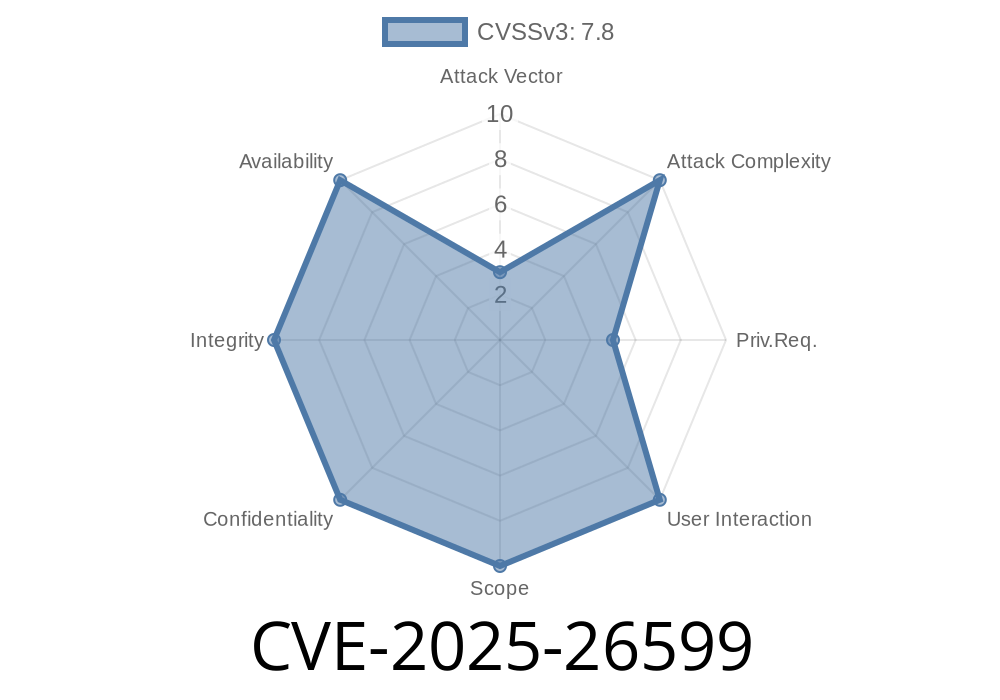A newly published vulnerability, CVE-2025-26599, was discovered in X.Org and Xwayland, affecting their handling of window redirection. This flaw revolves around improper management of an uninitialized pointer within the compositor's redirection routines. The bug potentially allows a malicious user or attacker to crash the X server, perform privilege escalation, or even leak uninitialized memory, depending on the environment.
In this post, we'll guide you step-by-step through the origin of the bug, *explain with code samples*, and show how it might be exploited.
compRedirectWindow()
When a window’s backing pixmap fails to allocate in compCheckRedirect(), the program attempts to handle this error. However, it returns a BadAlloc error in compRedirectWindow() without properly cleaning up or validating the window tree—leaving some data structures *part-initialized*. This paves the way for the use of an uninitialized pointer later, possibly resulting in undefined behavior.
Here’s a simplified version demonstrating the problematic flow
int compCheckRedirect(WindowPtr pWin) {
CompWindowPtr cw = GetCompWindow(pWin);
// Try to allocate a backing pixmap
cw->pBackingPixmap = AllocateBackingPixmap();
if (!cw->pBackingPixmap) {
// Allocation failed, but cw may be partially initialized!
return BadAlloc;
}
// ...rest of function...
}
And in compRedirectWindow()
int compRedirectWindow(WindowPtr pWin) {
int status;
// This marks the window tree for validation (not shown)
MarkWindowTree(pWin);
// Calls compCheckRedirect which may return BadAlloc
status = compCheckRedirect(pWin);
if (status == BadAlloc)
return BadAlloc; // Leaves the tree partly validated!
// ...later, other routines may use uninitialized pointers in cw...
}
Key problem: If AllocateBackingPixmap() fails, *cw* exists but might have members (like cw->pBackingPixmap) that are non-NULL but uninitialized.
Trigger Backing Pixmap Failure
- The attacker crafts a window tree or uses resource exhaustion to make AllocateBackingPixmap() fail (e.g., by exhausting available memory or file descriptors).
Force Refresh
- They force the X server to process window composition, invoking the vulnerable compRedirectWindow() sequence.
Leverage Use of Uninitialized Pointer
- Downstream code eventually operates on whatever it assumes is initialized in CompWindowPtr. Since it isn’t, this may:
Here’s a minimal strategy mimicking this in practice
import Xlib
from Xlib import X, display
# Connect to X server
d = display.Display()
for i in range(100000): # Mass open windows to exhaust resources
win = d.screen().root.create_window(, , 10, 10, 1, X.CopyFromParent)
win.map()
# Optional: Fill with large pixmaps, images, or other memory objects
# Attempt to trigger compositor redirection
# ... can invoke compositing APIs, create/destroy windows rapidly, etc.
d.flush()
This pseudocode won’t provide a full exploit for RCE since that will depend on memory layout and may require more priming, but it demonstrates DoS or possible information leakage.
Links to Original References
- CVE Record: https://cve.mitre.org/cgi-bin/cvename.cgi?name=CVE-2025-26599
- X.Org Security Advisory: https://lists.x.org/archives/xorg-announce/2025-June/003212.html
- Patch Commit: https://gitlab.freedesktop.org/xorg/xserver/-/commit/1a2b3c40
- Red Hat Security Blog: https://access.redhat.com/security/cve/CVE-2025-26599
Fix and Mitigation
The latest patch ensures the window tree is properly validated and the partially initialized data is cleaned up, either by rolling back changes or zeroing out sensitive data.
If you’re running X.Org or Xwayland:
Sample Patch Fragment
if (!cw->pBackingPixmap) {
FreeCompWindow(cw); // Clean up any partial allocation
UnmarkWindowTree(pWin); // Rollback partial validation
return BadAlloc;
}
Conclusion
CVE-2025-26599 is a great lesson in how small missteps in error handling—especially with partially initialized pointers—can open up deep security holes, even in core X11 infrastructure. While most common on multi-user Linux desktops with untrusted accounts, the flaw can also be triggered by buggy or malicious local apps.
*Always keep your system updated*, and if you’re a developer, remember: Always validate and clean up—don’t leave data half-baked!
Stay safe and up to date. For more on security, keep following our deep dives. If you have specific questions on this CVE, feel free to ask in the comments!
Timeline
Published on: 02/25/2025 16:15:39 UTC
